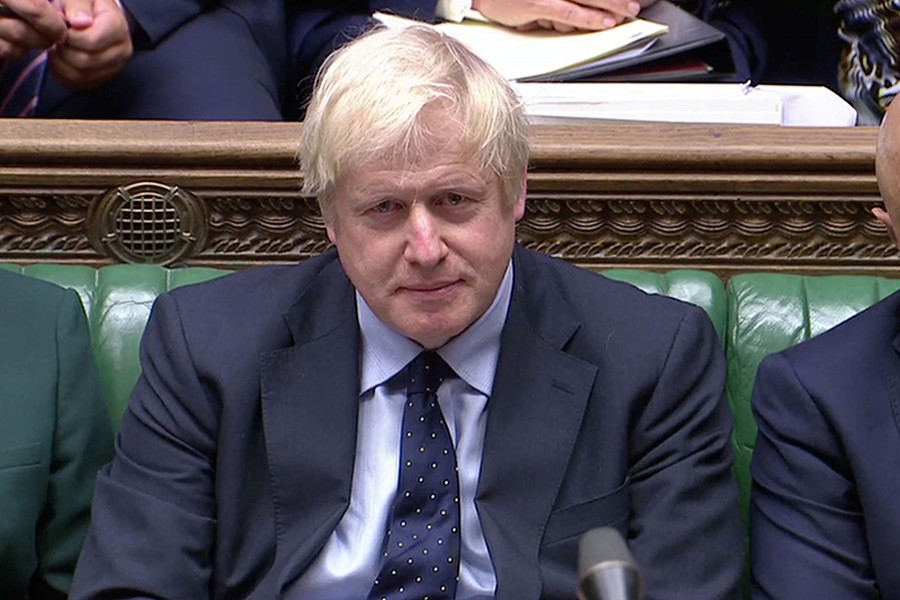Britain's Parliament must be given "a straight up-and-down vote" on the PM's Brexit deal, No 10 says, after MPs delivered a major blow to his strategy on Saturday.
Boris Johnson was forced by law to send a letter asking the EU asking for a new delay on Brexit, but did not sign it.
The PM now wants MPs to say a clear "yes" or "no" to the deal on Monday, adding: "We cannot allow Parliament's letter to lead to Parliament's delay."
It will be up to Speaker John Bercow to decide whether to allow the vote.
Mr Johnson reached a new deal with the EU last week, but needs approval for it from the UK Parliament.
The EU is now considering how to respond to the UK's request for a delay, but has said Saturday's developments did not mean that the deal had been rejected.
Why did the PM ask for an extension?
Having reached a new Brexit deal with the EU last week, the prime minster had intended to bring it to Parliament on Saturday and to ask MPs to approve it in a so-called "meaningful vote".
The numbers looked tight for the PM, especially without the support of his erstwhile allies the DUP, but Tory Brexiteers had thrown their weight behind it as had a number of Labour MPs and independents.
However, instead of voting on the deal itself, MPs instead voted in favour of an amendment - tabled by Tory MP Sir Oliver Letwin - withholding approval of the deal until the legislation to implement it had been passed.
That triggered the Benn Act which required Mr Johnson to send a letter to Brussels requesting a delay to the UK's departure.
He did that, but left it unsigned - and accompanied it with a second, signed letter which said he believed a delay would be a mistake.
On Sunday, ministers insisted the government believed it still had sufficient support in the Commons to pass the deal and remained committed to a 31 October departure.
The Cabinet Office, meanwhile, has triggered Operation Yellowhammer - its contingency plan to handle a no-deal Brexit - because it said there was no guarantee the EU would grant an extension.
So what happens now?
On Monday, the government will make a second attempt to hold the meaningful vote - without the Letwin amendment - presenting MPs with a binary choice to approve or oppose the deal in principle.
Whether Speaker Bercow will allow that, though, is not yet clear - he could rule it out on the grounds it amounts to debating the same matter twice.
No 10 said: "Letwin's delay amendment turned Saturday into a meaningless vote and denied MPs and the public the chance to end the uncertainty.
"They will have another chance today to deliver for the British public, so Parliament can move on to focus on the things that really matter - priorities like the NHS, police and schools."
It added: "Parliament needs a straight up-and-down vote on the deal - do MPs want to respect the referendum like they claim to... or do they want to frustrate and cancel Brexit altogether?"
The government also plans to introduce the legislation required to implement the Brexit deal - the Withdrawal Agreement Bill - during Monday's Commons session.
A government source said: 'The public will expect us to move at pace to get the withdrawal agreement passed so we can leave on 31 October. There will be time for Parliament to consider the legislation and any amendments."
Away from Westminster, Scotland's highest court will also consider the matter on Monday. It was asked earlier this month to sign a letter fulfilling the terms of the Benn Act on the prime minister's behalf if he failed to do so, but judges delayed giving a ruling to allow the political debate to play out.
What does the opposition say?
Labour, the SNP, Lib Dems and others roundly criticised Mr Johnson's decision to send two letters to the EU, calling it "childlike" and "petulant". They also suggested he may have broken the law - or at least tried to "frustrate" it.
On the deal itself, shadow Brexit secretary Sir Keir Starmer told the BBC's Andrew Marr that Labour would seek to make changes to it, in particular backing an amendment requiring it to be put to another referendum - up against Remain.
He said he believed that would most likely be tabled by a backbencher, but insisted: "It's got to go back to the public."
Labour had planned to vote against Boris Johnson's deal, arguing it would be bad for the economy, jobs, workers' rights and other areas such as the environment.
Sir Keir said the party would push for other changes when the bill was brought to Parliament, for example by demanding a UK-wide customs union with the EU and single market alignment, and ensuring there could not be a no-deal "trapdoor" at the end of the transition period if no free-trade agreement was reached with the EU.


